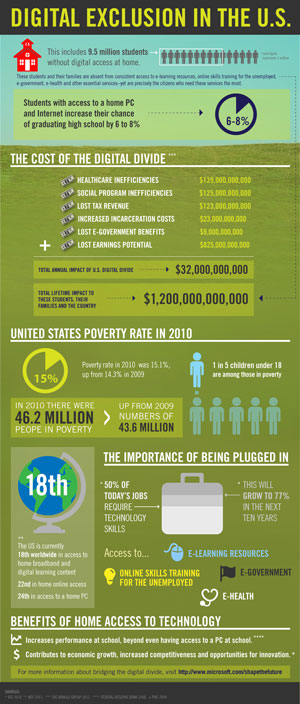NEW YORK — Sept. 20, 2011 — Today at the Clinton Global Initiative Annual Meeting, Microsoft Corp. launched a three-year program to ensure that 1 million students from low-income families in the United States receive the benefits of software, hardware and discounted broadband Internet service. The commitment is focused on filling the gap in home access to technology and helps give students in digitally excluded homes the skills training they need to compete in the global market, increase employment opportunities and contribute to their community’s economic recovery.
Today’s announcement extends Microsoft’s global Shape the Future program, which has provided technology and access to over 10 million students around the world over the past five years. Through this new commitment, Microsoft will work with state, city, nonprofit and private organizations — including the Federal Communications Commission (FCC), Network for Teaching Entrepreneurship (NFTE) and One Economy — to develop and accelerate reduced-cost programs and policies that will include the following:
-
Windows-based PCs optimized for students
-
Broadband Internet access
-
Microsoft education software
-
Job skills training
“At Microsoft we believe all students should have access to the building blocks of a quality education,” said Anthony Salcito, vice president, Worldwide Education for Microsoft. “Putting technology in the hands of a student who did not have access is a powerful step on the path leading to graduation, employability and a better future.”

Microsoft launches a three-year program to ensure that 1 million students from low-income families in the United States receive the benefits of software, hardware and broadband Internet service.
In the U.S, approximately 9.5 million students are digitally excluded outside of their schools. According to the Federal Reserve, these students have a high school graduation rate six to eight percentage points lower than those who have home access to the Internet. The impact is significant. The resulting lost earning potential to the country is $825 billion, lost tax revenues are $123 billion and social program inefficiencies top $125 billion. According to a recent study (The Arnold Group 2011), the cumulative impact of digital exclusion for these students to the U.S. economy is $32 billion every year, and over the working lifetime of these students, it is over $1.2 trillion.
This commitment extends Microsoft’s original vision of a PC on every desktop and in every home and is part of Microsoft’s corporate citizenship efforts, which are increasingly focused on creating opportunities for youth around the world.
“Roughly 100 million Americans remain unconnected to high-speed Internet, and the economic cost of digital exclusion is rising every day,” said FCC Chairman Julius Genachowski. “This isn’t a problem for government alone. The private sector, nonprofit groups and government actors must work collaboratively to close this gap, create jobs and ensure America’s global competitiveness. Substantial commitments to bring digital access to millions more Americans are a significant step in the right direction.”
Charlotte, N.C., and Seattle are among the first cities actively supporting Shape the Future by launching digital inclusion initiatives for students in their cities. Project L.I.F.T in Charlotte and the Great Student Initiative in Seattle will enable public and private partnerships that bring technology access to needy youth in their regions. Over a three-year period, all 50 states plus Guam and Puerto Rico will have the opportunity to participate.
“Economic growth and stability starts with quality education, and Charlotte is proud to be on the forefront of this effort by supporting Microsoft and Project L.I.F.T. in this commitment,” said Mayor Anthony Foxx. “In this tough economic climate, public private partnerships have the potential to make digital access more attainable for students and their families. I applaud Microsoft for extending its resources to the City of Charlotte, Mecklenburg County and the Charlotte-Mecklenburg School system.”
“Entrepreneurship education has the power to transform the lives of so many young people and prepare them in a unique way to be both the job creators and the workforce of the future,” said Amy Rosen, CEO of NFTE. “It is so exciting for us to be working with Microsoft to provide digital access to our entrepreneurship education program so that all young people reached through this commitment will lead their lives prepared to be successful entrepreneurs.”
More information on Shape the Future is available at
http://www.facebook.com/#!/shapethefutureproject and http://www.microsoft.com/publicsector/ww/programs/shape-the-future/Pages/index.aspx.
Founded in 1975, Microsoft (Nasdaq “MSFT”) is the worldwide leader in software, services and solutions that help people and businesses realize their full potential.
Note to editors: For more information, news and perspectives from Microsoft, please visit the Microsoft News Center at http://www.microsoft.com/news. Web links, telephone numbers and titles were correct at time of publication, but may have changed. For additional assistance, journalists and analysts may contact Microsoft’s Rapid Response Team or other appropriate contacts listed at http://www.microsoft.com/news/contactpr.mspx.




